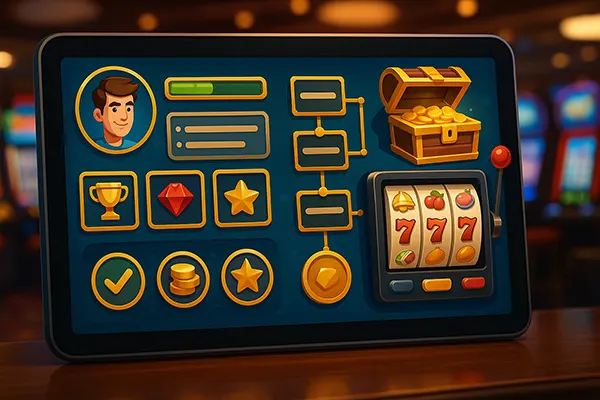
Gamification in Casinos: How Gambling Platforms Are Becoming Video Games
In recent years, the gambling industry has undergone a significant transformation. One of the most notable shifts has been the integration of gamification elements—features traditionally associated with video games—into online casinos. This evolution has changed the way users interact with gambling platforms, turning passive play into engaging, goal-driven experiences. The purpose behind this trend is clear: to increase user engagement and retention through immersive and interactive gameplay mechanics.
Why Gamification Is Reshaping the Casino Experience
Gamification introduces various mechanics like levels, missions, achievements, and reward systems. These features give players clear objectives beyond simply spinning reels or placing bets, fostering a sense of progress and satisfaction. Unlike traditional games of chance, gamified experiences encourage players to stay longer and return frequently to complete new tasks or unlock bonuses.
Another key reason for this transformation is the growing popularity of video games among adults aged 25–45. This demographic is accustomed to systems that reward skill, loyalty, and time investment. By mirroring video game features, casinos make their platforms more appealing to this audience, creating a competitive edge in a saturated market.
Moreover, gamification aligns with evolving consumer expectations. Users now seek personalised experiences and platforms that adapt to their behaviour. Casino operators are responding by introducing elements such as storylines, progression bars, and avatars—tools that allow players to feel a stronger connection to the platform and their journey within it.
Real-World Examples of Gamified Casinos
Casumo is one of the pioneers in this area. Players earn experience points (XP) as they bet and complete missions, allowing them to climb levels and unlock new features. This sense of advancement mimics role-playing games, keeping users motivated and entertained.
Loyalty programs in casinos like Mr Green or LeoVegas also incorporate gamified elements. Players join reward clubs where they can move through different tiers and access increasingly valuable perks. These systems use visual indicators like badges and rankings to signify status, boosting competitiveness and participation.
Another notable example is Duelz Casino, where players engage in battles against others while playing slots. Winning games and completing tasks earns rewards and opens up new abilities—directly emulating multiplayer gaming environments with social interaction and competition at their core.
The Psychology Behind Gamified Engagement
Gamification taps into fundamental psychological principles such as motivation, reward, and achievement. Players are driven by intrinsic motivators—curiosity, challenge, and the desire for mastery—which casinos amplify by offering structured goals and measurable success.
These mechanisms also trigger dopamine responses. Each achievement, reward, or level-up is accompanied by a sense of accomplishment, reinforcing positive feedback loops that encourage continued play. This carefully designed stimulation system borrows directly from behavioural psychology, especially practices used in mobile gaming design.
Furthermore, social proof plays a strong role. When players see leaderboards, public achievements, or progress comparisons, they’re encouraged to keep pace with or outdo others. This social dynamic can greatly increase activity and time spent on the platform, giving casinos an additional tool for user retention.
Risks and Responsible Use of Gamification
While gamification enhances engagement, it also raises concerns around responsible gambling. The very mechanics that make platforms exciting can lead to excessive or compulsive play. This is especially true when rewards are tied closely to spending or prolonged use.
To mitigate risks, some casinos implement self-exclusion tools and progress tracking dashboards. These features allow players to monitor their behaviour and set personal limits—balancing entertainment with safety. Educating users on how gamified systems work is equally vital to reduce potentially harmful patterns.
Regulatory bodies are also adapting. In the UK, the Gambling Commission has emphasised the importance of transparent marketing and fair gameplay, ensuring that gamification doesn’t mislead or manipulate users. Operators are now expected to assess the impact of their systems through ethical design principles.

The Future of Gamified Casino Platforms
As technology continues to evolve, gamified features are expected to become even more immersive. Virtual reality (VR) and augmented reality (AR) are already being explored to create realistic environments where players can move freely, interact with others, and complete challenges in simulated casino settings.
Artificial intelligence will also play a larger role in customising experiences. Through behaviour tracking, platforms will adapt quests, bonuses, and game difficulty to suit individual players, enhancing satisfaction while encouraging sustained participation. These AI-driven features will create highly personal, evolving journeys across casino environments.
Additionally, partnerships between casino operators and game developers are growing. By collaborating on unique, gamified products, platforms can offer exclusive content that blends skill and chance in novel ways. This fusion will likely define the next generation of digital gambling, where the lines between traditional gaming and gambling continue to blur.
Gamification as a Competitive Necessity
In 2025, offering gamified elements is no longer a novelty—it’s a competitive requirement. Casinos that ignore this trend risk falling behind, particularly among younger users seeking innovation. Traditional platforms must now reimagine their offerings to stay relevant and exciting.
Gamification also provides valuable data. By analysing user choices and progression, operators gain insights into preferences and behaviours. This data fuels improved game design, marketing strategies, and customer support systems—enhancing the overall ecosystem.
Ultimately, gamification enables casinos to offer something beyond chance. It transforms passive betting into meaningful interaction, empowering users to feel more control, investment, and enjoyment from their online casino experience.
Latest News
-
Randomness and RNGs: Myths About “Rigged” ...
Few topics create more arguments in gambling than the idea that slots are “rigged”. In 2026, the …

-
Types of Slots: Classic, Video Slots, Mega...
Slot games look similar on the surface, but the underlying mechanics can feel completely different once you …

-
How to Keep a Bankroll Journal Properly in...
A bankroll journal is not a “nice-to-have” habit — it is a control tool that shows what …

